Puppies
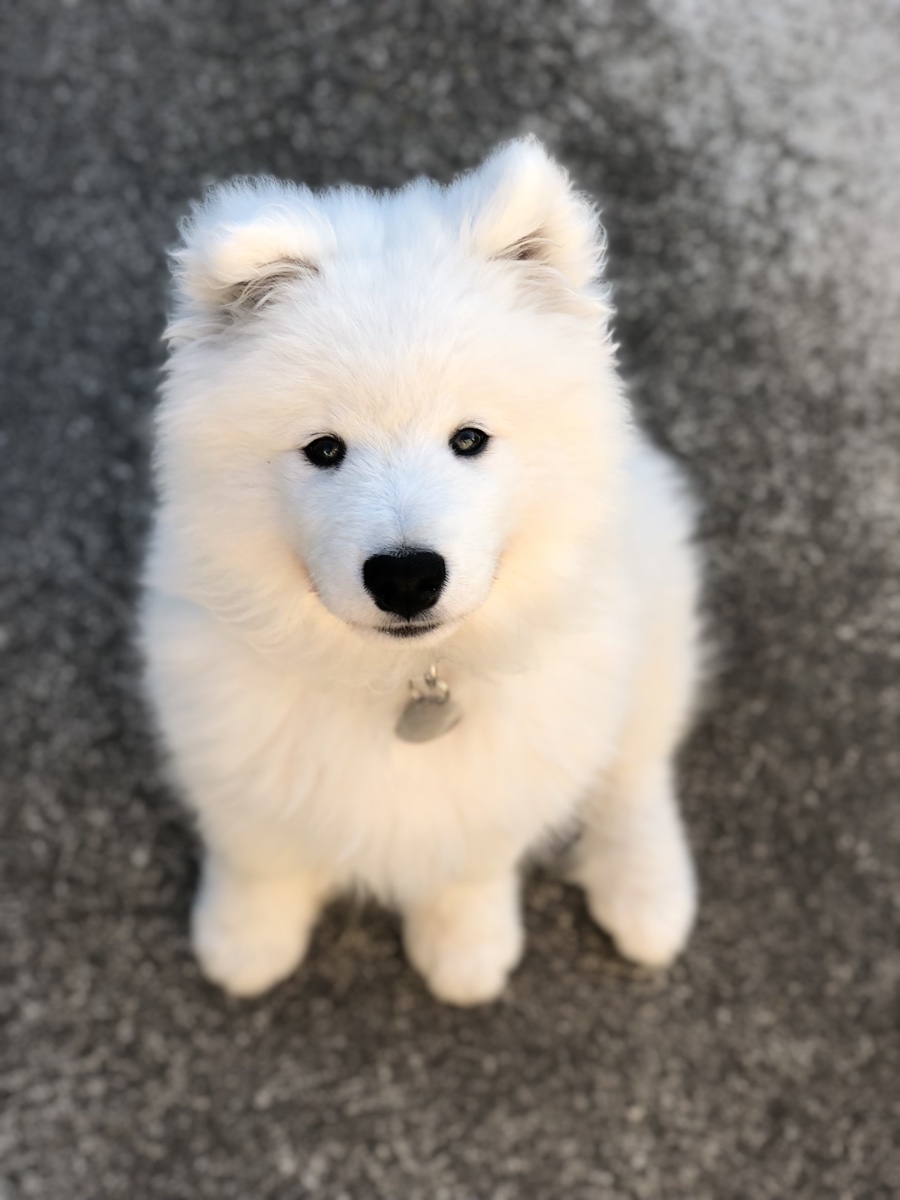
Our Samoyed puppy, Jez (short for Jeremy), is now 7 months old. We picked him up at 2 months old (8 weeks). I've never raised a puppy before, so I did a lot of research before we got one, but there was a lot I missed. I've since learned a lot about puppies I didn't know, and wanted to share some of our experience. There's not really a good way to structure this into a narrative, so it's just a big list of thoughts on various puppy-related topics.
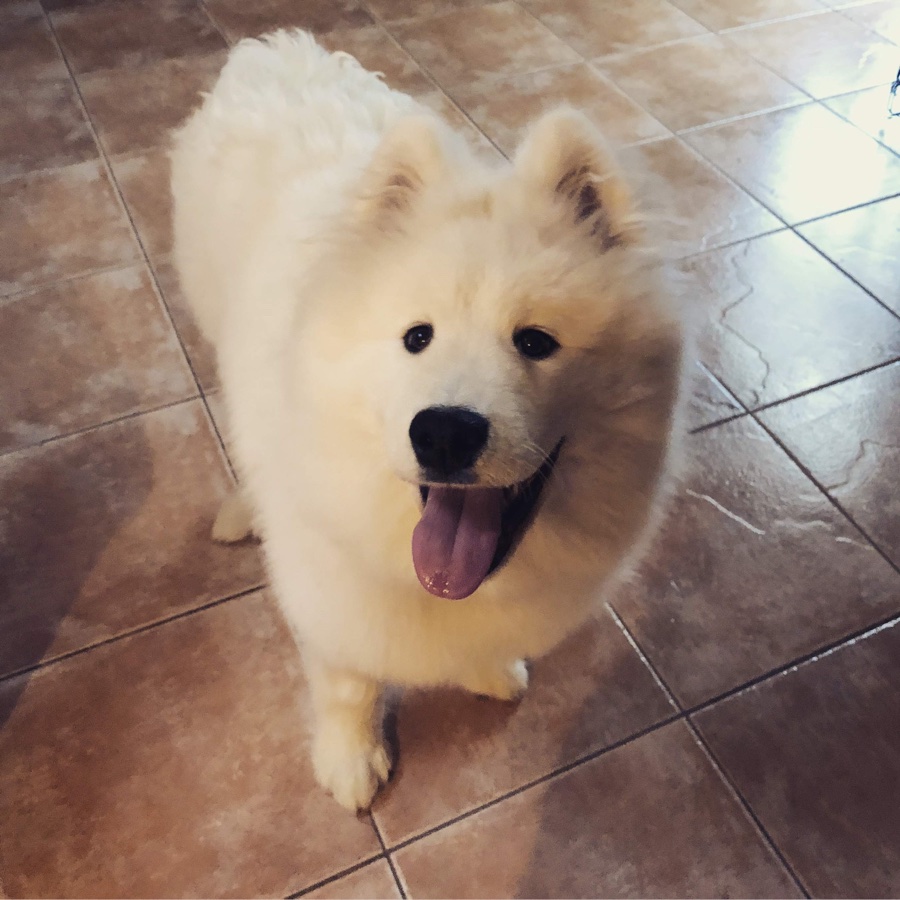
Puppies are hard
Everyone told us puppies are hard. But actually, I'm not convinced all those people even knew just how hard puppies are. They warned us about things like toilet training and not sleeping at first, but there's so much more that makes puppies hard, such as:
- They bite a lot
- They need play and exercise every day
- They need enforced naptime and don't want it, like toddlers
- Seriously, they bite. It hurts a lot, because their puppy teeth are really sharp
- They whine and cry, and they can go for hours
- They don't know the rules of our world yet, so you have to either contain them or watch them every single minute at first. Seriously, every minute. They get into things so quickly
- They don't all like pats and cuddles. Ours still doesn't like these much, and when he was younger he would mostly try to nibble or bite when you wanted to pat him
- Biting. For real
Biting is definitely one of the worst things, and if you browse /r/puppy101, you'll see it's a common struggle for new puppy parents. I think what makes biting so bad is that it's extremely hard to keep your cool and be patient when you're being hurt. Between us we had mostly scratches, and only had broken skin a couple of times, but some people get much worse injuries.
I'll explain this more in the training section below, but we used only positive reinforcement training. That basically means we encourage and reward behaviours we like and try to make sure unwanted behaviours don't get rewarded (e.g. yelling and jumping around after being bitten rewards the puppy for biting by making him think you're playing a game now). We never punished him for biting or anything else, because trusted sources say this isn't the best way for puppies to learn.
There are lots of resources online about dealing with biting, so I won't go into it much, but I will say that yelping like a hurt puppy didn't work at all for us, but brief time-outs in the crate did (removing yourself for a time-out is another option, but often difficult to do with a puppy snapping at your heels).
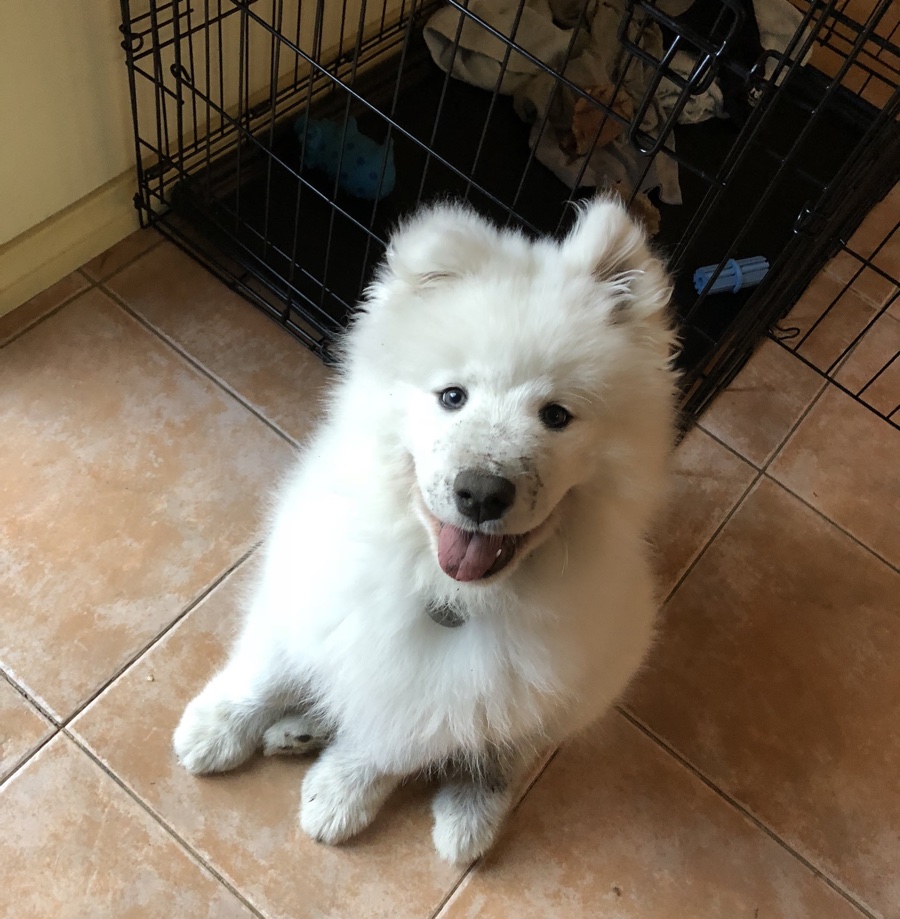
Mental stimulation
Everyone talks a lot about exercising your dog enough, and how "a tired dog is a good dog". I think this is true to some extent, but it seems at least as important, if not more so, to exercise your dog's brain. Especially if you have a smart breed that gets bored easily.
We feed our pup all his meals from Kongs. Most people use these as treats. They're sturdy rubber toys designed to let dry food or treats fall out when your dog rolls or bounces them around. Over time, as our puppy got better at getting the food out of his Kongs, we made them harder and harder. These days we fill them with a mixture of plain Greek yoghurt and his dry food, with a little peanut butter on the end to keep the food in. Then we freeze them overnight.
To be honest, I'm not sure how he gets the food out. He lies down and chews on the Kong, making disgusting noises, and eventually it's empty. Near the end he often throws it around a bit to loosen up what's left. For a normal Kong, he'll take around 20-30 minutes to eat it, depending on how tired he is. We also have Genius Kongs, which have a smaller hole that makes it harder to get the food out, and these can take around 45 minutes to eat.
So they keep him busy, and give him a mental workout while he eats.
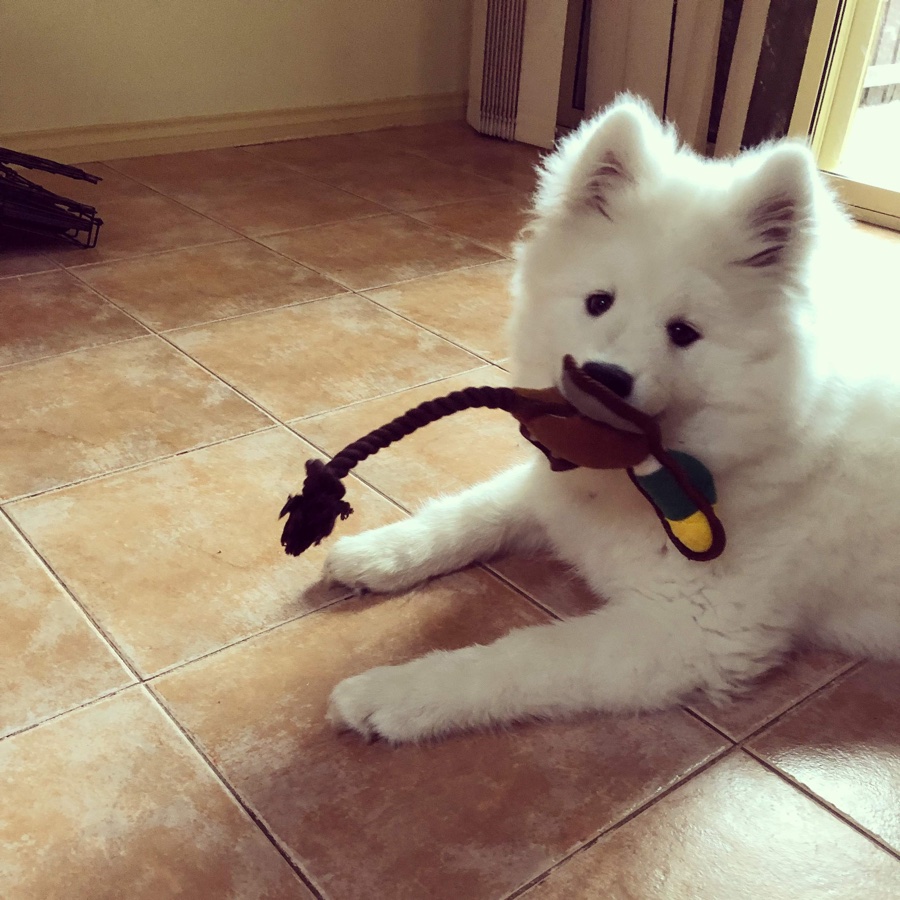
Some other food puzzles we give him include rolling up treats tightly inside a towel so he has to dig them out, and stacking plastic cups together with treats between them.
We also do lots of training to work his brain. We teach him tricks just for fun, and because learning gives him a mental workout, and we work a lot on general manners and behaviour, teaching things like going to his crate when told, staying for longer periods, and letting us touch him in different places to make him comfortable with grooming and vet checks.
Sometimes we play games with him as well, like hide and seek, where he either waits while we hide, or while we hide his toy.
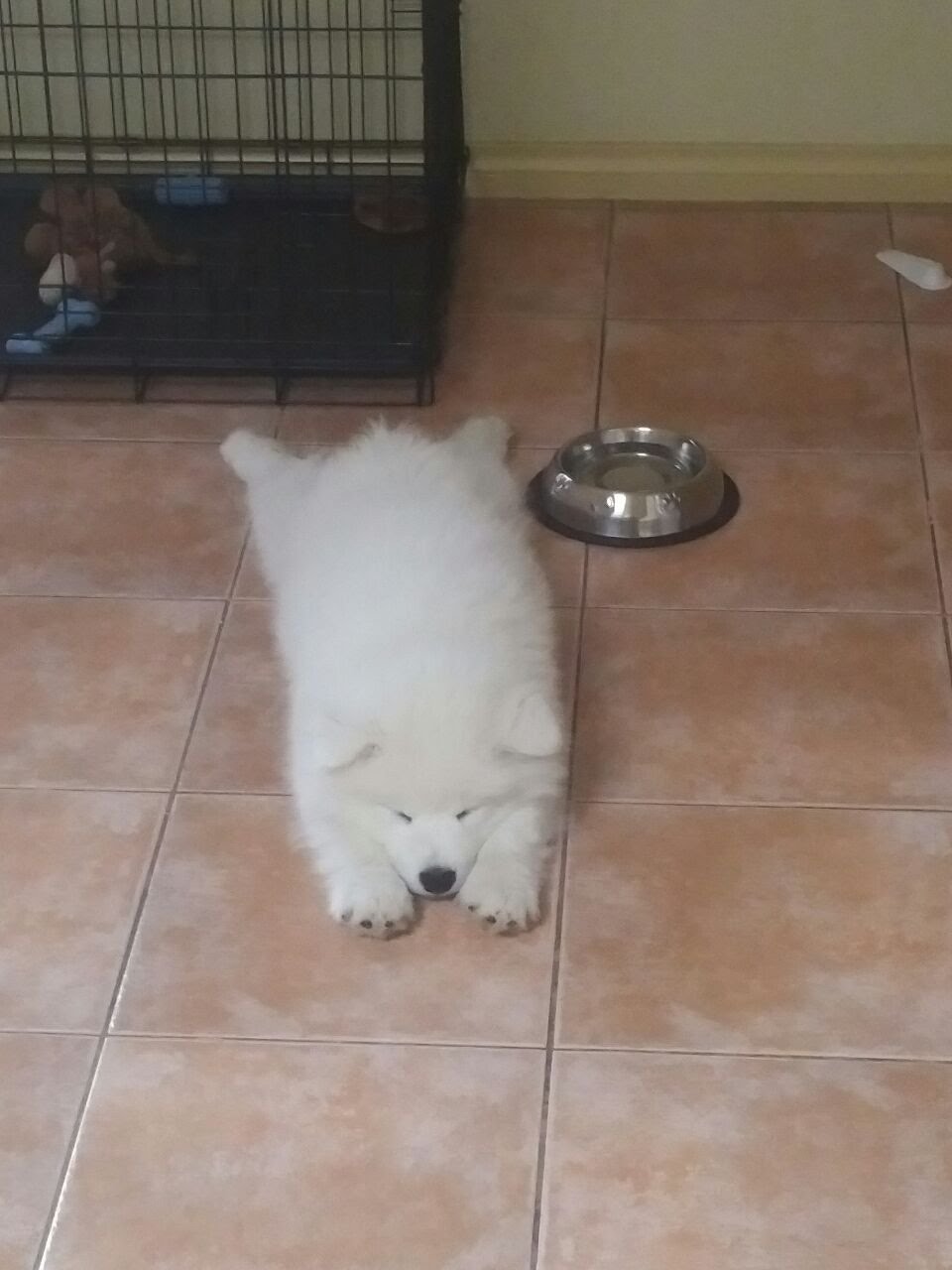
Walking
Dogs don't know how to walk on a lead. This might seem obvious, but teaching loose-lead walking (i.e. not pulling) is a really common struggle among dog parents. We work on this almost every day and it's still really tough.
Every walk we do is a training exercise, because until our pup can walk well on the lead without pulling, we can't just go for a walk. So our walks consist of periods of training where I use treats to encourage him and change direction a lot so he learns to pay attention and follow me, and periods of exploring, where I let him sniff and wander a bit (he's also not allowed to pull on the lead while sniffing, so I'm in training mode the whole time).
We also have to watch for bicycles, runners, and other people and dogs, because they can come out of nowhere and get your pup worked up, which can make the rest of the walk a nightmare.
I guess my point is, walking a puppy is exhausting. I do it almost every day right now, but early on we only went a couple of times a week for about 10 minutes because he was too young to do much more.
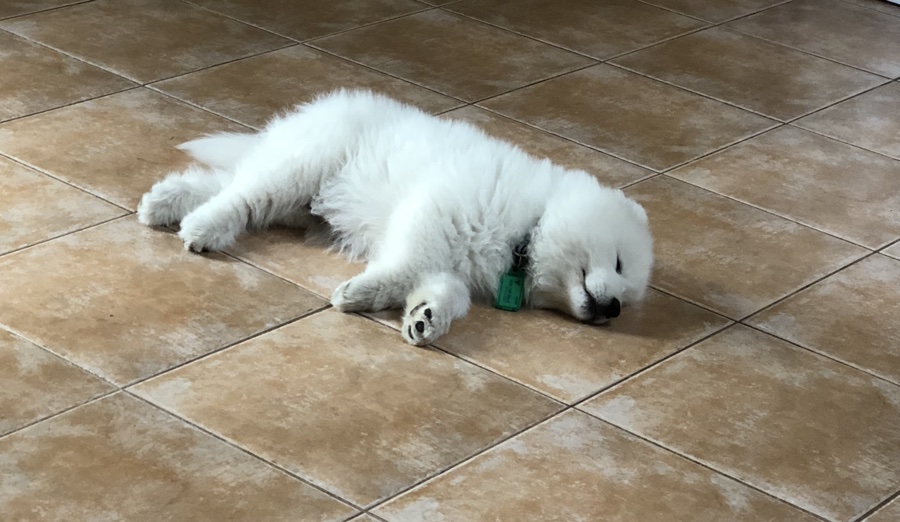
Training
I mentioned training a bit already, but I also want to say that it helps to work on manners and behaviour first, and leave tricks for when your pup needs more mental stimulation later.
We used the positive reinforcement approach to raising our puppy, which is generally the most accepted and recommended approach among animal trainers and animal welfare organisations. The idea is that you use rewards (usually food treats, but can be pats or play, depending on your pup) to reinforce behaviours you like. And when your puppy does something you don't like, you redirect them to something you do like, then reward it. Puppies don't know what we think is good or bad, so we essentially have to teach them what earns treats and what doesn't, so they'll do more of the treat-earning behaviours. Eventually (after 12 months of age is the rough consensus, I think) you can start very slowly weaning your puppy off the treats until they only get treats occasionally, because the behaviours have been ingrained for so long that they become natural.
Starting with sitting and lying down help a lot, because you can use these to teach your puppy not to do things you don't like, by giving them these alternatives. Teaching sit also helps a lot with general manners and impulse control. There's an idea floating around from a dog trainer called "Sit to say please", which we used. Once you've taught sit, you can teach your pup to sit when they want things. Our pup sits to be let out of his crate, to go through doors, to get food and water, to play tug, etc.
Here's Jez not doing a trick, but just rolling around on the floor and stretching after a nap:
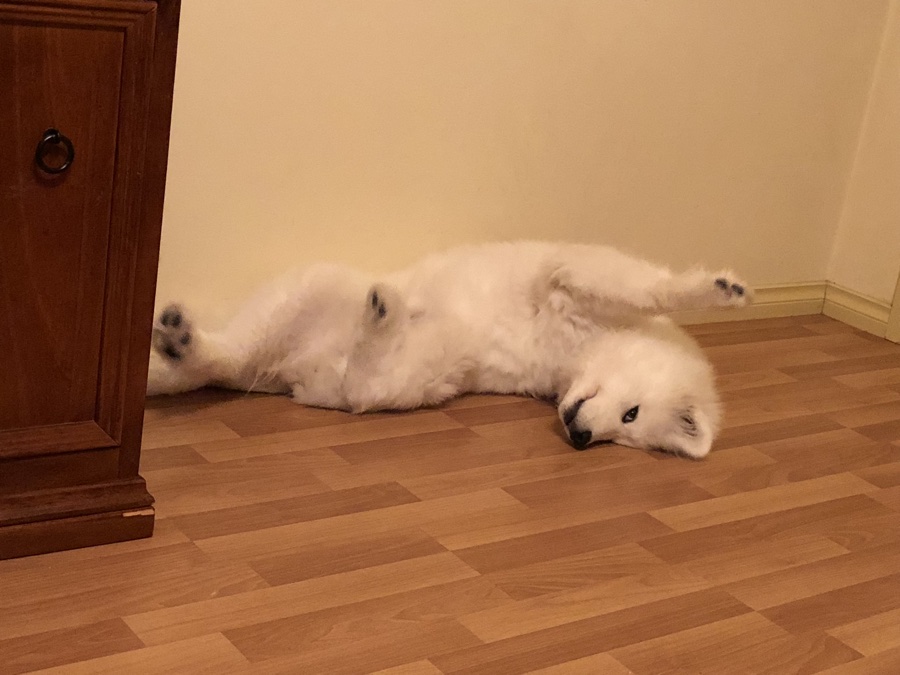
They get in the way
For a while, we couldn't put our shoes on or change our clothes or hang up the washing, or leave the house. Our puppy wants to be part of everything. So activities like putting on shoes either become training exercises or you have to constrain your pup before you do them every time. Even now I often throw my puppy treats if he stays lying down quietly instead of attacking my jeans while I get changed.
Leaving the house has taken ages to train. Every dog is different, but our breed is a people dog and ours is a velcro pup. And a sook. We use Photo Booth on my MacBook to film our puppy when we're out of the house. You can get apps and devices to stream a video to your phone so you can check on your puppy, but we've found not being able to know how much of a fuss he's making until we get home forces us to relax more and not worry about him while we're out.
We started by leaving for short trips of about 30 minutes, and have worked up to being able to leave him for up to 3 hours. A lot of this just came from practice and him getting older. Initially he would whine and bark a lot while we were out. More recently he'd taken to lonesome howling that sounded extremely pitiful. And these days he barely makes a sound.
But again, every dog is different, and some people have far less trouble. Since we work from home, we also didn't practise this as much as people who had to do it every weekday.
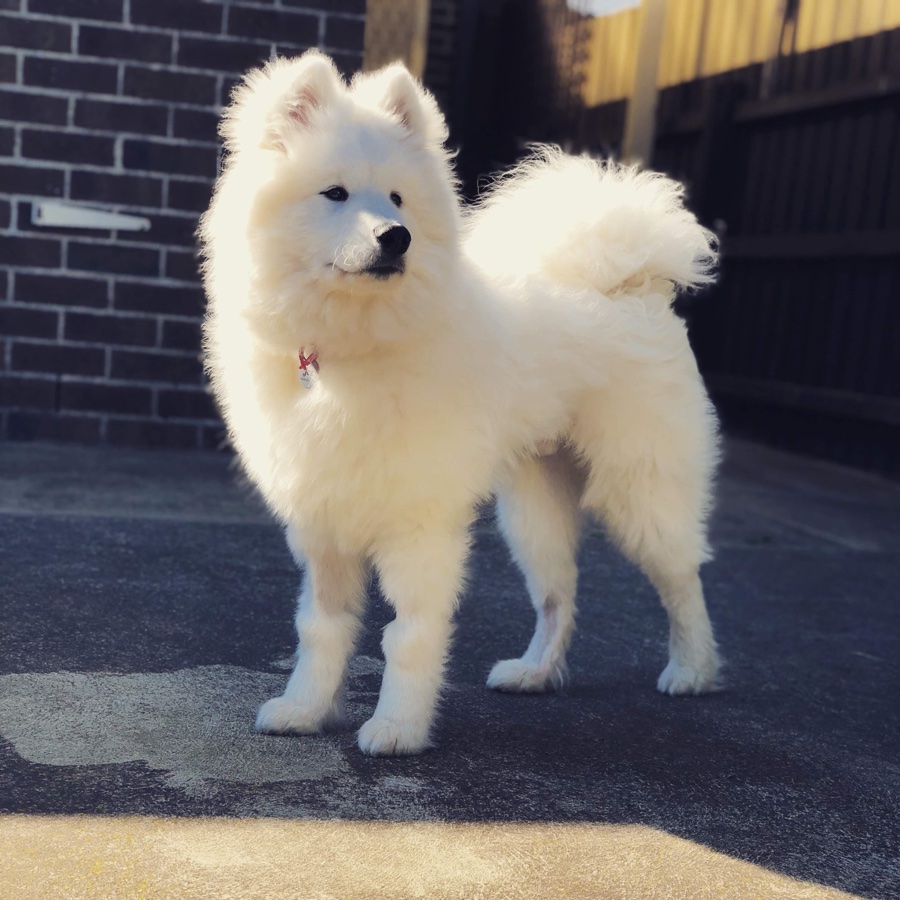
Crate training
Opinions on crates seem to be divided. I've heard Europeans say they're uncommon or banned in some places and they'd never consider it. But it seems common and accepted in the U.S. Here in Australia it's pretty well accepted, too.
In case you haven't heard of them, they're basically wire cages. You can put a bed or a soft mat inside for your puppy to sleep on. The idea for puppies in particular is that they don't like to soil where they sleep, so it helps a lot with house training because they'll make a fuss when they want to go to the toilet instead of quietly going inside. They're also handy for keeping your puppy from getting into anything they can ruin or get hurt by when you're not home or can't watch them. Here's Jez in his crate:
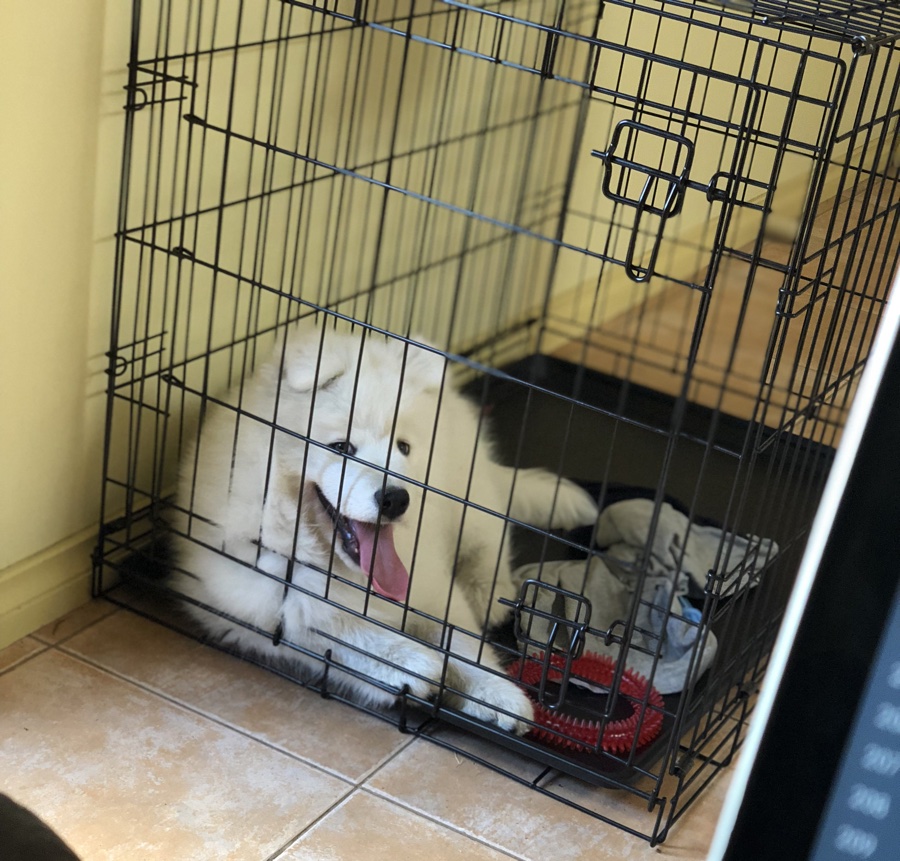
We wavered a lot in our conviction about crates at first, because it was so hard. Our puppy never hated his crate, but he hates being alone and made a lot of fuss at night. But with time and age he calmed down and he hops in without encouragement at bedtime now.
The crate has also been super useful for calming him down when he gets silly, or for giving him a time-out when he's biting or jumping and can't control himself.
Lack of sleep
Puppies disrupt your life in a similar way to babies. They need attention and care all the time, and you should expect to be sleep deprived for a while after bringing one home.
At first, puppies have tiny bladders that they can't hold for long, and of course they don't know that they should go to the toilet in certain spots only. For both these reasons, you need to take your puppy to their toilet spot a lot. Every time they play or run around (excitement makes them need to wee), after every meal or big drink, and multiple times per night.
Sleep deprivation for us came from both toilet trips and Jez whining in his crate at night. After every toilet trip we had to worry about getting him settled again, and he felt like he was being abandoned all over again. (Puppies think abandonment = death, so they will whine their little hearts out at first.)
Over time he whined less and less, and he needed fewer toilet trips, but it took a long time before he totally slept through the night. Even last month we were still struggling to get him to sleep later than 5am. So be prepared for sleep loss, because it's horrible but pretty much guaranteed.
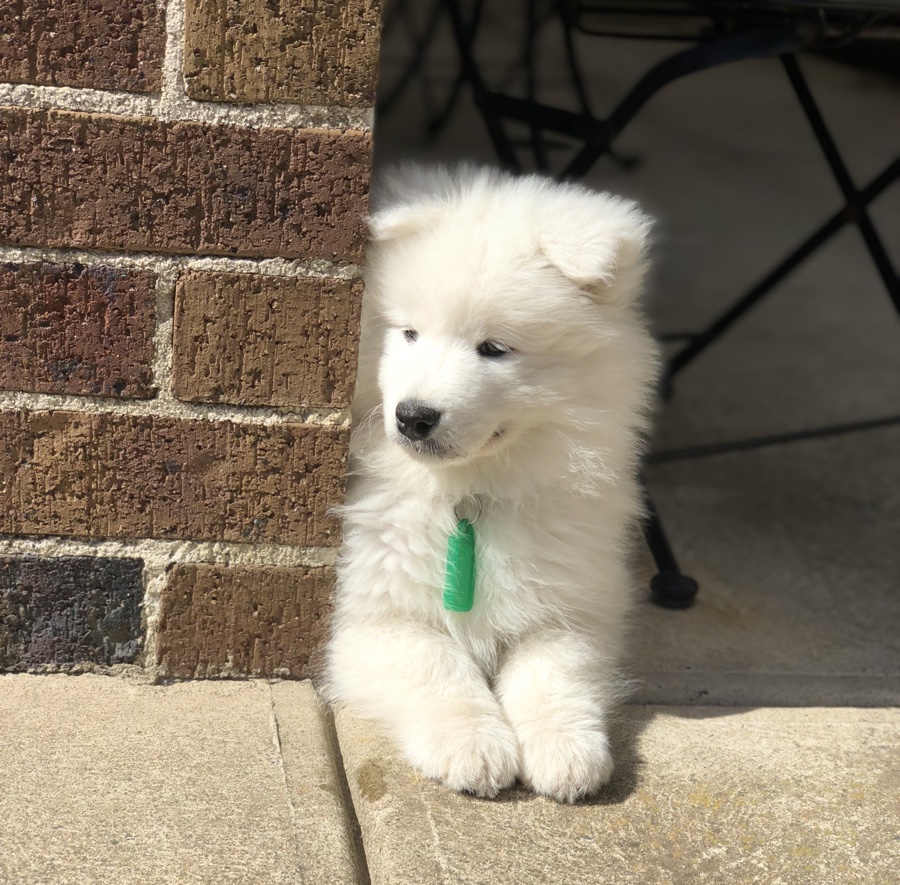
There's a lot to learn about puppies, and about each individual, because they're all different. This isn't meant to be a primer for raising a puppy, but just some observations about what happened for us. If you want to learn more, definitely check out /r/puppy101 on Reddit. If you've never raised a puppy before, it'll enlighten you to things you never imagined you'd have to deal with.
(Like adolescence. Did you know dogs go through adolescence? Apparently they start "talking back", ignoring you, and pushing boundaries. We haven't hit this yet but we're pretty nervous about it.)
On Samoyeds
Since Jez is a Samoyed, here are some extra, breed-specific observations for anyone interested:
Shedding
Jez sheds a lot, but it's really the worst when he's losing his whole coat for the change of seasons. At that point, even brushing daily won't stop the onslaught. But the rest of the time, brushing a couple of times a week keeps the worst of it at bay. We do notice odd hairs getting in the washing, in our mouths, and on our clothes, though. And we have to use sticky rollers on our clothes a lot.
Also, Jez loves to eat his hair, so if he finds a little ball of it floating around, he'll just gobble it up if we don't catch it first.
Barking
Samoyeds can be a vocal breed, so we were really nervous about having to train Jez not to bark. We've been lucky that this has mostly been a non-issue. The only time he's barked a lot was when he was home alone and not comfortable with that yet. Mostly he won't bark when other dogs are barking, when someone comes to the door, or when he wants something, unless he's overtired or super worked up.
Velcro
A "velcro dog" is one that really sticks to their owner(s). That's Jez. If he's sleeping and you get up and move, he'll scramble to jump up and follow you. He has to know where you're going at all times. And although he's doing really well at being calm and quiet in his crate when he's home alone, if just one of us leaves the house, the other one has to deal with whining, running, anxious toilet trips, and a whole lot of nonsense just because one of us went out the front door. It's not the worst issue to have in a puppy, but it would be nice if we could train him to be more independent.